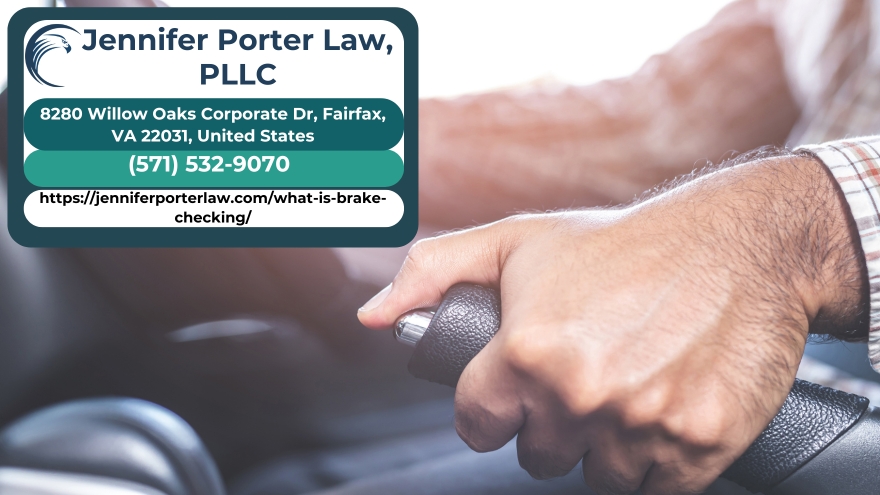Financial News
Northern Virginia Car Accident Attorney Jennifer Porter Explains the Dangers of Brake Checking
Brake checking is a term many drivers may have heard but not fully understood—until it results in a serious collision. Northern Virginia car accident attorney Jennifer Porter (https://jenniferporterlaw.com/what-is-brake-checking/) is shedding light on this aggressive and illegal driving maneuver in her latest publication, “What is Brake Checking?” Drawing from real-world scenarios and current Virginia laws, the article emphasizes how brake checking endangers everyone on the road and complicates legal and insurance outcomes for all parties involved.
In the context of Northern Virginia’s congested traffic and high-speed highways, the maneuver of intentionally slamming on the brakes to startle a tailgating driver can lead to devastating rear-end collisions. The blog from Jennifer Porter Law, PLLC explains that what may begin as a reaction to frustration or an attempt to "teach a lesson" can quickly escalate into a serious legal matter. Northern Virginia car accident attorney Jennifer Porter outlines how rear-end accidents caused by brake checking often involve severe injuries such as whiplash, traumatic brain injury, and broken bones, with outcomes further complicated by Virginia's contributory negligence laws.
Northern Virginia car accident attorney Jennifer Porter clarifies that brake checking is not specifically named in Virginia statutes, but is effectively illegal due to its classification under reckless and aggressive driving laws. According to Virginia Code § 46.2-852, any driving behavior that endangers life, limb, or property, such as abrupt braking without cause, qualifies as reckless driving. Offenders can face charges ranging from misdemeanors to felonies, depending on the damage caused. Jennifer Porter, as a Northern Virginia car accident attorney, explains that brake checking may also fall under aggressive driving laws, particularly if the action was intended to harass or intimidate.
“Even if the trailing driver is tailgating, brake checking is not a legal or safe response,” writes Jennifer Porter. “It puts all drivers at risk and can carry serious legal consequences.”
The article details how the aftermath of brake-checking incidents becomes complicated not only due to the severity of physical damage but also because of Virginia’s strict contributory negligence rules. Under this doctrine, any driver found even one percent at fault in an accident cannot recover damages. If both the brake-checking and tailgating drivers are found to have acted negligently, neither may be eligible for compensation. This creates significant hurdles for injured parties and raises the stakes for evidence collection and legal representation.
Jennifer Porter highlights several legal tools that can support a case involving brake checking, including dashcam footage, eyewitness statements, physical evidence from the crash site, and police reports. These sources can help determine whether the lead driver intentionally caused the accident or whether the trailing driver failed to maintain a reasonable distance. As the article explains, insurance adjusters and courts rely heavily on this evidence to assign fault and resolve disputes.
Beyond legal implications, the article explores the public safety concerns surrounding brake checking. It not only contributes to accidents but also escalates road rage incidents. Aggressive interactions between drivers can spiral into retaliatory driving, confrontations, or even physical altercations, further increasing the risks to bystanders and other motorists. Jennifer Porter uses the article to underscore the importance of de-escalation and maintaining safe driving practices in high-pressure traffic situations.
The post also provides a clear set of recommended actions for drivers involved in a brake-checking incident. These include moving to safety, calling law enforcement, collecting evidence at the scene, notifying insurance providers, and seeking legal assistance. Jennifer Porter stresses that immediate and informed responses can make a significant difference in protecting one’s legal rights and recovering compensation for injuries or property damage.
Virginia drivers are also cautioned about the risks of tailgating. Although the focus of the article is brake checking, Jennifer Porter emphasizes that following another vehicle too closely is also a violation of Virginia law under § 46.2-816. However, reacting to tailgating with brake checking only adds danger and potential liability.
Legal options following a brake-checking incident are limited by the strict standards of Virginia law, making early legal consultation critical. The last clear chance doctrine is one narrow exception to the state’s contributory negligence rule, but as explained by Jennifer Porter, proving its application in court requires substantial evidence and legal argumentation. This makes it essential for injured parties to seek timely and knowledgeable representation to assess the strength of their case and navigate the legal process effectively.
Brake checking may seem like a momentary expression of frustration, but it can carry long-term consequences, both physical and legal. Drivers in Northern Virginia face high stakes when involved in such incidents. With aggressive driving on the rise and traffic conditions becoming more challenging, Jennifer Porter uses her latest article to encourage safer, more thoughtful behavior behind the wheel and to offer clear legal guidance for those impacted by dangerous driving actions.
For those injured in a collision caused by brake checking or who are unsure of their rights following a traffic incident involving sudden braking, Jennifer Porter Law, PLLC, offers legal representation focused on securing fair compensation. Early legal advice can prevent avoidable errors in insurance reporting, strengthen liability arguments, and protect claimants under Virginia law.
About Jennifer Porter Law, PLLC:
Jennifer Porter Law, PLLC represents car accident victims in Northern Virginia, offering legal services focused on personal injury claims, liability disputes, and insurance negotiations. Led by attorney Jennifer Porter, the firm provides legal support tailored to the needs of individuals injured in traffic accidents involving reckless or aggressive driving.
Embeds:
Youtube Video: https://www.youtube.com/watch?v=GUTgET6MdcE
GMB: https://www.google.com/maps?cid=1633844614801486416
Email and website
Email: jennifer@jenniferporterlaw.com
Website: https://jenniferporterlaw.com/
Media Contact
Company Name: Jennifer Porter Law, PLLC
Contact Person: Jennifer Porter
Email: Send Email
Phone: (571) 532-9070
Address:8001 Braddock Rd Suite 102
City: Springfield
State: Virginia 22151
Country: United States
Website: https://jenniferporterlaw.com/
More News
View More





Quotes delayed at least 20 minutes.
By accessing this page, you agree to the following
Privacy Policy and Terms Of Service.




